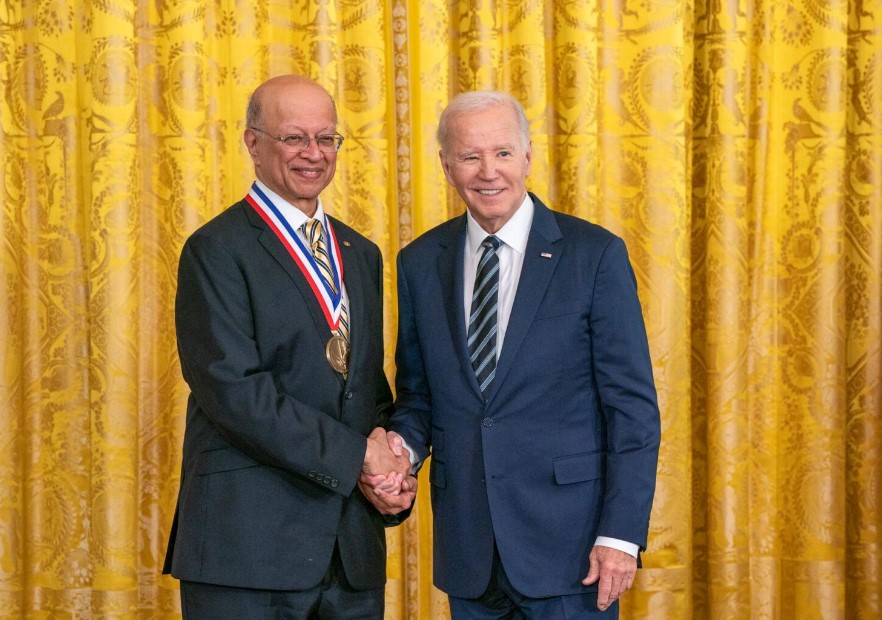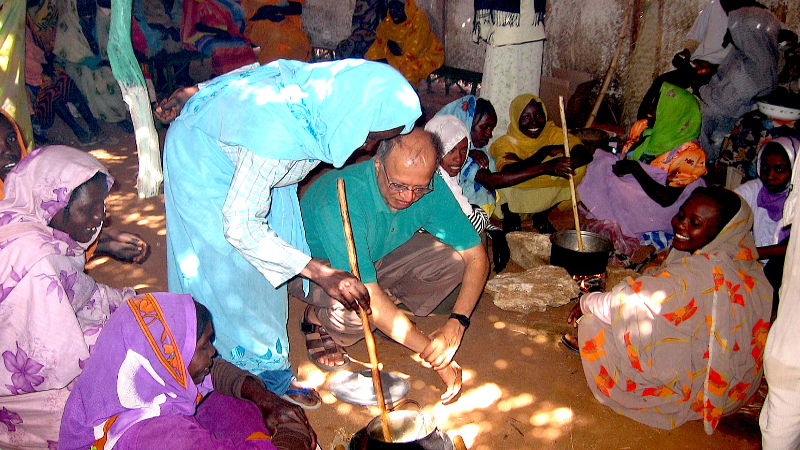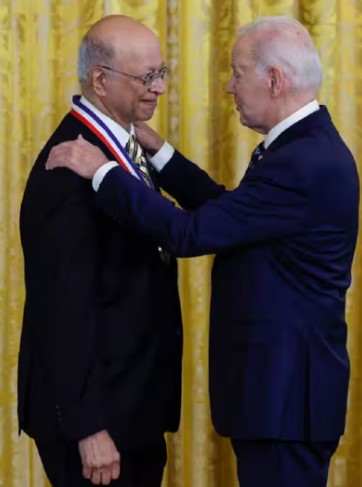(April 13, 2024) When Dr Ashok Gadgil went to the US in 1973 to do Ph.D. from UC Berkeley, he was struck by the stark differences between the United States and India. One striking contrast was the excessive use of fertilizers on American front lawns – a sharp disparity to the agricultural needs in his homeland and the constant struggle for resources. This instilled in him a sense of purpose towards improving the lives of those in less fortunate societies, countries, and circumstances.
In 2023, he was presented with a National Medal for Technology and Innovation by US President Joe Biden, at the White House, for providing ‘life-sustaining resources to communities around the world. Over the years, Dr Gadgil has driven numerous inventions, harnessing technology to address urgent problems faced by people in low-resource settings. His work encompasses a wide range of areas, from water purification to efficient lighting, infant care and fuel-efficient cooking options, among others.

Dr Ashok Gadgil recdeiving National Medal from Biden in 2023
“His innovative, inexpensive technologies help meet profound needs from drinking water to fuel efficient cookstoves. His work is inspired by a belief in the dignity of all people and in our power to solve the great challenges of our time,” it was announced at the award ceremony while he stood up to receive the award.
Purpose – to make a difference
Talking about his earlier days in an interview with the Berkeley Lab News Centre, he shared:
Nobody I knew had a Ph.D., and I didn’t even know that you had to get a Ph.D. to learn to do research. But what matters is your curiosity and the fire in your belly, and wanting to somehow, make a difference.
Throughout his illustrious career, Dr Gadgil received numerous awards and accolades. These include the prestigious Heinz Award, the Lemelson-MIT Global Innovator Award, The Zayed Sustainability Prize, Zuckerberg Water Prize, LBNL Director’s Award for Exceptional Achievement in Societal Impact, the Patents for Humanity Award among others.
Following his retirement from the Lawrence Berkeley National Laboratory (Berkeley Lab) as a faculty senior scientist, where he served from 1980 to 2023, Dr Gadgil has continued to contribute as a Distinguished Professor Emeritus in civil and environmental engineering at UC Berkeley.
Sudan’s Darfur War and Dr Gadgil’s contributions
Between 2003 and 2020, a conflict in Sudan’s Darfur known as War in Darfur or Land Cruiser War, killed lakhs of people, forced millions from their homes, and destroyed traditional livelihoods. Many had to reside in large displacement camps where they received food aid but were still required to gather firewood to cook their meals. For this, women either walked hours to find a single tree, risking assault at every step or purchased wood at unaffordable prices from the vendors.
In response to this crisis, USAID, the world’s premier international development agency headquartered in Washington DC requested Dr Ashok Gadgil in 2004 to help design a better cooking alternative for refugees in Darfur – the Sudanese region in Northeast Africa.

Dr Gadgil at a refugee camp in Rwanda
The Indian-American civil and environmental engineer designed the stove that had the capacity to burn less than half the wood or charcoal required in a traditional stone fireplace. Gadgil focused on cost effectiveness and simplicity so that the stove could be manufactured locally. Since then, lakhs of women have benefitted from the fuel-efficient wood-burning cookstoves. It eased their financial burden, reduced their families’ exposure to smoke, and diminished their exposure to violence during wood collection. This innovation also helped reduce carbon impact on the planet.
When I visited a refugee camp in Darfur, a couple came up to me and asked me my name. After I told them, they said, “We are going to give that as the middle name for our child.” I was totally blown away. I was humbled. These moments are hard to forget.
Dr Ashok Gadgil remarked in an interview with Berkeley Lab News Centre
Since the stove was designed in partnership with Lawrence Berkeley National Laboratory it was named the Berkeley-Darfur Stove. In an interaction at IIT Bombay, Dr Gadgil had said, “One of the things I cite to my students is a quote of Gandhi. It says, whenever you are in doubt about your course of action, think about effect it will have on the weakest member of the society and that would lead you to the right course of action,”
Disinfecting drinking water, saving lives
Eleven years prior to the Darfur war, Dr Gadgil had worked for UV Waterworks, a project sparked by a 1993 cholera epidemic in South and Southeast Asia. Dr Gadgil’s response was to invent a device that used UV light from a low-pressure mercury discharge (similar to that in a fluorescent lamp) to disinfect drinking water.
Always focussing on simplicity and ease of use for people on ground, he designed a system which had no moving parts and could be operated using even a car battery or solar cell to disinfect approximately four gallons of water per minute. Millions of people in South and Southeast Asia benefited from the device. It was estimated to have saved more than one thousand lives annually.
A project that he has been working on since 2005 focuses on cost-effective arsenic removal from groundwater. It now operates through two community-scale plants in India, serving 5,000 people each at less than a rupee per litre.
The technology is also being introduced to California’s Central Valley to address arsenic contamination, benefiting low-income rural communities reliant on contaminated groundwater. These initiatives are aimed to alleviate economic burdens and improve access to safe drinking water locally.
Dr Gadgil is revered by his students to whom he always advises:
Make sure you deliver something that actually works well, delivers value at an affordable price, and solves a problem. At the same time, do it in a humble way, where you listen to the community and respect them.
Another significant project of Dr Ashok Gadgil in the field of water purification was ECAR (ElectroChemical Arsenic Removal) that addressed the issue of arsenic contamination in groundwater – a problem that was fatal for one out of five adults in Bangladesh. The ECAR initiative involved use of small amounts of electricity for controlled release of iron rust. The rust binds irreversibly with the arsenic and gets removed as it settles with arsenic, leaving the water safe to drink. The process was effective at room temperature and enjoyed success rate even with high levels of arsenic in water.
Preventing infant deaths
Dr Gadgil developed a plant based non-electric infant warmer to prevent infant deaths from hypothermia – a situation where the body loses more heat than it is generating.
In an interview with NDTV after winning the National Medal for Technology and Innovation last year, he had remarked, “About one million infants die in the first days of their birth from hypothermia. The places where they die do not have reliable electricity. The infant warmer has reduced all-cause deaths of neonatal patients by a factor of three for a large trial in Rwanda public hospitals. That’s a very dramatic impact.”
Advancing the field of Development Engineering
In addition to numerous inventions, Dr Gadgil has authored and co-authored hundreds of journal and conference papers. He is the founding editor of Open Access journal, Development Engineering published by Elsevier, and has been serving as editor of the Annual Review of Environment and Resources for the last 20 years.
Dr Gadgil has also taught graduate courses on Development Engineering at UC Berkeley and co-edited the first graduate-level text book on the subject that was released in 2022.
Apart from winning numerous awards he has been inducted in the Inventors Hall of Fame and elected to the National Academy of Engineering. He has more than 150 refereed archival journal papers, 140 conference papers, and several patents to his credit.
I think the joy of discovery and inventing is amazing. The opportunity to work with some of the brightest people in the research field just by being here and being in Berkeley is a joy.
Dr Gadgil shared in his interview with the Berkley Lab News Centre
From Bombay to Berkeley
Born in Bombay in 1950, Dr Gadgil did his bachelors in Physics from the University of Bombay, MSc in Physics from the Indian Institute of Technology, Kanpur, M.A., Physics from University of California, Berkeley and PhD in Physics from the University of California, Berkeley.
Before his long stint at the Lawrence Berkeley National Laboratory (LBNL), California, the Global Indian worked for Environmental Energy Technologies Division at the Tata Energy Research Institute, and National Centre for Scientific Research, Paris.

Dr Ashok Gadgil with US President Biden
What’s next?
In an interview, he hinted at his next project – how to avoid a large number of heat deaths ‘which are coming to the developing world faster than anybody is ready for.’
“People with training in STEM and with intentions to make the world a better place, have amazing power to do so. Societally, we just have to have the strong intention for a just and sustainable future for all, and the solutions will be there, they are within reach,” he told Berkeley Lab News Centre.
- Follow Dr Ashok Gadgil on LinkedIn

